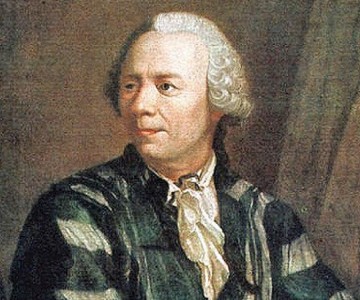
Leonhard Euler
Leonhard Paul Euler was a renowned Swiss mathematician and physicist. Born in Basel, on the 15th April 1707, Euler was the oldest son of the Calvinist pastor Paul Euler and Marguerite Brucker, who was also daughter of a pastor, and he had two younger sisters, namely Anna Maria and Maria Magdalena. Euler spent his childhood in Riehen, in Switzerland. Influenced by his father who wanted him to have a religious career just like his, he studied Theology and graduated from the University of Basel at only 17 years old.
Since an early age Euler revealed great skills in the area of Mathematics, and while studying he took some private classes with Johann Bernoulli, one of the greatest mathematicians in Europe at the time, who was also a good family of the Euler family.
At the age of 20, in 1727, Leonhard Euler worked as a doctor for the Russian Marine, and he accepted a job as an assistant Mathematics professor in the Russian Academy of Sciences in St. Petersburg, Russia, dividing his time between the two activities. In 1731 Euler became an official Mathematics professor in the same institute. It was also in Russia where Euler met his wife Katharina Gsell, with whom he had a total of 13 children, though only 5 reached adulthood.
Although he was well-known within the academic field, he only acquired international fame and acknowledgment in the Mathematics area in 1735, when he solved the “Basel problem”, which consisted on the precise sum of the reciprocals of the squares of the natural numbers.
Besides his studies within the field of Mathematics, Euler also stood out by his contributions to the areas of Physics and Astronomy, and even after he lost the sight on his right eye in 1738, he continued to develop studies in multiple scientific areas.
However, given the politic instability that was felt in the country, Euler and his family were forced to leave Russia; the mathematician goes to Berlin, in Germany, where he starts working in the Berlin Academy, and also as a tutor of Princess Anhalt-Dessau. A few years later, in 1766, Euler returns to Russia, and he even became the director of the Russian Academy Sciences; he would die in the country on the 18th September 1783, at 76, due to a brain hemorrhage.
During his life, Euler contributed greatly to the development of the scientific world, being considered on the best and most prolific mathematicians of all times, having studied several areas, such as number theory, series, calculus of variations, mechanics, the problem of vibrant membrane, the logarithm of negative numbers (imaginary numbers), Fermat’s little theorem or the graphs theorem, which represents the solution for the Seven Bridges of Königsberg problem. It was also Euler the one who proved that all perfect even numbers belong to the formula created by Euclides: 2n-1(2n – 1), where 2n – 1 is a prime number. It was also Euler who invented the popular game Sudoku, inspired by the Latin square.
Euler’s contribution to the field of Mathematics have been internationally acknowledged and premiered several times; he won the Paris Academy Prize Problem twelve times, was represented on the 6th series of banknotes of the Switzerland Bank and in various stamps in Switzerland, Germany and Russia, he is celebrated by the Lutheran Church on the 24th May and an asteroid was named Euler in his honor.




